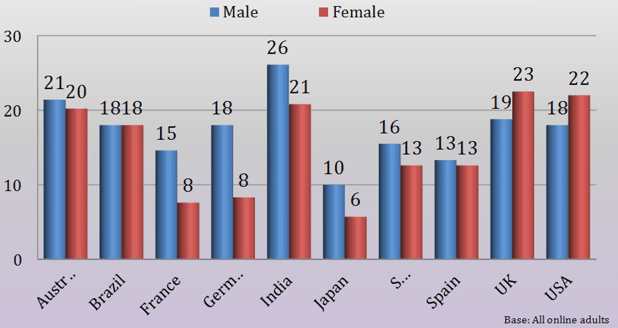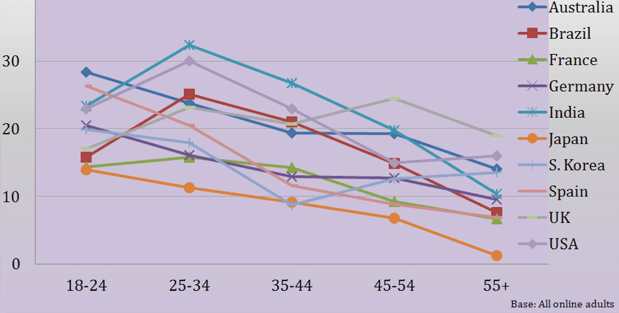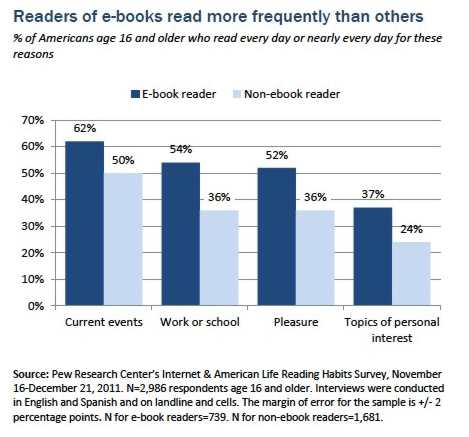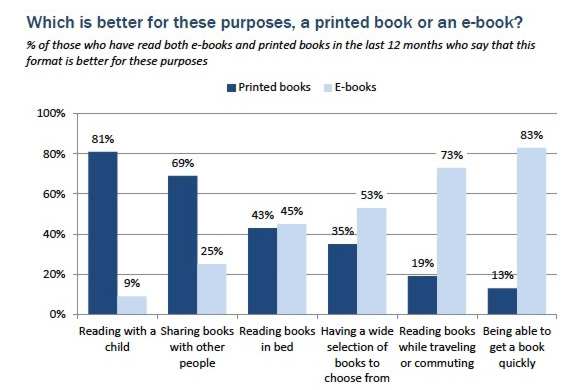| E-Book Trends Revealed |
| Written by Janet Swift | |||
| Saturday, 14 April 2012 | |||
|
Data from several sources provides insights into the state of the e-book market and the reasons why consumers choose e-books rather than print books. As we've reported in the past growth in the sales of ebooks has been pretty phenomenal - tripling year on year in early 2011. Since then there's been a further 50% growth, according to the latest statistics from Association of American Publishers. On Amazon Kindle books have outsold print books for almost a year and technical book publisher O'Reilly reports that ebooks outsell print books by a factor of more than four. The popularity of e-books does vary geographically. Research for Bowker’s Global e-book Monitor that was conducted among the online population in 10 countries – Australia, Brazil, France, Germany, India, Japan, South Korea, Spain, the U.K. and the U.S. – in early 2012 showed that India came top in terms of e-book purchase, with 24% of respondents having bought an e-book in the previous six months. The survey showed that Australia, the U.K. came next at 21% with the U.S close behind at 20%. Respondents in France and Japan were the least likely to have purchased an e-book, at 8% and 5% percent respectively. More males than females purchased e-books in every country apart from the U.S. and the U.K,. where females outnumbered males, and Brazil where the two genders were equally likely to be e-book purchasers.
(click in chart to expand)
Looking at the age of e-book purchasers, in almost all markets, the older the respondents, the less likely they are to have recently purchased an e-book. Purchase rates in India, Brazil, the U.K., U.S. and France are highest in the 25–34 age group, with Australia, Spain, Germany, South Korea and Japan highest among 18-24 year olds.
(click in chart to expand)
For this survey, drawn from the online population, the minimum number of respondents in each country was 1000; weighted to be representative of the adult (18+) population in terms of age, sex and region. Findings from Pew Research suggest that 43% of Americans aged 16 and over read digital formats of books, newspapers or magazines and that those who read ebooks stand out from other readers: They read more books than other readers. They read more frequently and are more likely than others to read for more purposes. They consume books in all formats, including print and audio: 88% of those who read e-books in the past 12 months also read print books. But they are also more likely than others to have bought their most recent book, rather than borrowed it, and they are more likely than others to say they prefer to purchase books.
As the above chart shows, the category where the discrepancy between e-book and other readers was widest was reading for work or school. 78% of e-book readers were in that category and 54% of them read this type of book on a daily basis. When asked in what circumstances they preferred digital format the overwhelming reason for choosing an e-book was being able to get a book quickly. As the Pew Report points out: the digital format has a lopsided advantage when it comes to being able to get a book quickly, no doubt because instant wireless downloading is possible with e-book reader devices and tablets.
As the chart shows, e-books were also found preferable for reading while travelling or commuting and for reading in bed - perhaps contributing to the phenomenon of working from bed with mobile devices that we recently reported.
More InformationAssociation of American Publishers Press Release Bowker Releases Results of Global eBook Research Pew Research: The rise of e-reading O'Reilly State of the Computer Book Market, Part 5
Related ArticlesSales of Kindle books outstrip print books
Comments
or email your comment to: comments@i-programmer.info
To be informed about new articles on I Programmer, subscribe to the RSS feed, follow us on Google+, Twitter, Linkedin or Facebook or sign up for our weekly newsletter.
|
|||
| Last Updated ( Saturday, 14 April 2012 ) |







